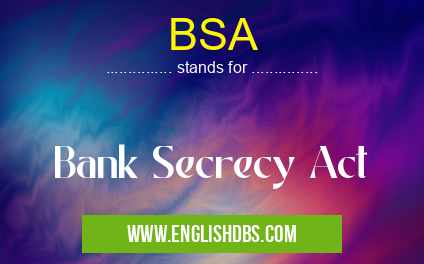What does BSA mean in BANKING
The Bank Secrecy Act (BSA) is a law enacted by the United States government to deter and detect money laundering, terrorist financing, fraud and other financial crimes. It requires banks and other financial institutions to maintain records of transactions and report suspicious activity to the Treasury Department.

BSA meaning in Banking in Business
BSA mostly used in an acronym Banking in Category Business that means Bank Secrecy Act
Shorthand: BSA,
Full Form: Bank Secrecy Act
For more information of "Bank Secrecy Act", see the section below.
Essential Questions and Answers on Bank Secrecy Act in "BUSINESS»BANKING"
What is the Bank Secrecy Act?
The Bank Secrecy Act (BSA) is a law enacted by the United States government to deter and detect money laundering, terrorist financing, fraud and other financial crimes.
What kind of records does the BSA require institutions to store?
Under the BSA, institutions are required to keep records of all customer transactions that involve cash or monetary instruments such as checks or credit cards. They must also report suspicious activity to the Treasury Department.
What types of activities are considered suspicious activity?
Suspicious activity includes large deposits or withdrawals, multiple deposits without sufficient explanation, or transactions involving businesses associated with criminal activity. Any unusual patterns of activity can also trigger suspicion.
Final Words:
The Bank Secrecy Act is an important tool in protecting our banking system from financial crimes. It requires banks and other financial institutions to maintain records of customer transactions, particularly those involving cash or monetary instruments, as well as report any suspicious activity they observe. By doing this, we can help ensure that our banking system remains secure and reliable for everyone.
BSA also stands for: |
|
| All stands for BSA |
